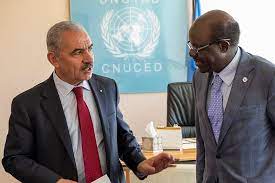Share
Human Rights Voices
While the UN devotes its human rights operations to the demonization of the democratic state of Israel above all others and condemns the United States more often than the vast majority of non-democracies around the world, the voices of real victims around the world must be heard.
Palestinian Authority/Gaza, July 7, 2022
Blood libel by PA premier Shtayyeh, claims Israel conducting ‘lab experiments’ on Palestinian bodies
Original source
Palestinian Authority Prime Minister Mohammad Shtayyeh claimed this week that Israel was experimenting on the corpses of suspected Palestinian terrorists, a charge vociferously denied by the Israeli Foreign Ministry on Thursday.
Israel holds the bodies of some Palestinians killed by Israeli forces while committing acts of terrorism. The policy is controversial within the defense establishment and has faced several High Court challenges.
“We have learned that Israel uses these corpses in the labs of medical schools in Israeli universities. This is a brazen assault on human rights and scientific ethics,” Shtayyeh claimed. He provided no evidence for the claim.
In a statement, the Israeli Foreign Ministry denied the Palestinian claim and slammed the PA for inciting violence.
“The Foreign Ministry expresses horror at the defamatory remarks, which constitute another expression of the continuing incitement by the Palestinian Authority against Israel. Such incitement encourages shedding the blood of Israeli civilians,” the ministry said in a statement.
Israeli authorities have a policy of holding the bodies of those killed while committing violent acts of terrorism or allegedly trying to do so.
In a statement announcing the policy in September 2020, Defense Minister Benny Gantz said that it was part of an “extensive deterrence apparatus.”
The High Court had ruled that deterrence is not a legitimate reason to withhold the bodies of terrorists. In 2019, Supreme Court Chief Justice Esther Hayut ruled that current legislation only enabled the government to hold the bodies as bargaining chips for negotiations with Hamas terrorists over its Israeli captives.
But a High Court ruling in late 2021 appeared to defer to the security establishment’s judgment. “There is no error that justifies judicial intervention,” wrote Justice Neal Hendel for the majority in one such case.

